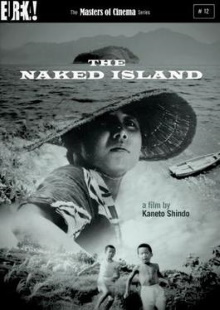This is the first time we’ve watched a film by director Kaneto Shindo though if the quality of this one is any indication we should have done so much sooner. It seems that the director specifically wanted to make this as a film with no dialogue at all and indeed there isn’t any. The only spoken words in the film are songs and chants yet there is no difficulty in understanding this simple but emotionally resonant piece.
A family of four lives on their own on a small island just off of a larger one. There is only marginal land on the island and so they must plant crops on the slopes. Worse, the island has no freshwater supply of its own, so every day the two parents must make multiple trips by boat to the larger island to fetch water and carry the huge buckets up the slopes of their island. They use the water both for their own personal use and to irrigate their crops. One of their two young sons goes to the school but the other one helps out around the island doing odd jobs. Despite the harshness of this life, the family still have their moments of happiness such as when they go a nearby city for a day trip by ferry. Meanwhile seasons pass and they vary the work to be done according to the season but there is always more work to do.
With no dialogue at all, all of the characters are unnamed but that doesn’t matter as the film gets us to sympathize with them just fine. It is actually rather hard to believe that anyone would put up with such grueling day to day routines as the mother and father must start fetching water before dawn and keep making multiple trips throughout the day. The film was actually shot on an uninhabited island so perhaps it exaggerates the extent to which even the poorest people must resort to in order to survive. But this is an effective and heartbreaking film especially when it shows how they must give up three quarters of their harvest to the local lord and how they are contented with the simplest of pleasures, such as a bath at the end of the work day. Once again, I note that this film touches you precisely because it shows that as difficult as life is for this family, they do have something to live for and pleasures to look forward to. Films that emphasize the misery of its characters by showing nothing but a series of tragedies would work nowhere as well.
It’s intriguing to me how much the film leaves unsaid and how much it relies on the audience forming our own conclusions. For example did the parents consciously send one boy to school and are forced to keep the other one at home to help with work? We never get to hear that discussion but we can imagine it and so infer how much their future hopes rest on the boy who goes to school. As there is no dialogue we never get to see the inside of the shops and buildings they visit but we can imagine what goes on there. When the family tries to sell a live fish, we understand what is going on as they first try a large restaurant and then move downwards the value ladder. Similarly their sheer joy as they ride the cable car or look down on an expansive view of the city is conveyed without the need for words at all. It’s masterful how the film tells so much of its story by having the audience fill in the details for themselves.
One thing about this film is that it probably overdoes the contrast the rich and the poor, making it too obvious that this is a fictional family and the film itself a kind of morality play. It feels like it’s too much to have the family stuck in the previous century when seemingly everyone else has 20th century conveniences like electricity, motorized boats and even television. But I suppose reality can surprise us sometimes with its extremes. Nevertheless this is a simple but effective film that should be a great watch for just about everyone.
